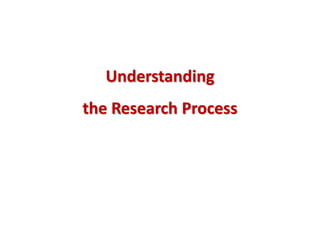
Understanding the Research Process: Key Concepts for Evaluating Psychological Studies
- 2. How do psychologists prove their theories? • You decide that you are going to prove that: being an organized student has NO or a BIG impact on students’ grades. • How would you go about proving this theory? • Brainstorm with two or three other students.
- 3. Researchers Need 1. A plan 2. People willing to participate in the study 3. A method for collecting and analyzing the data
- 4. • Aim • Target population • Procedure • Findings
- 5. • AIM – the purpose of the study. It indicates which behavior or mental process will be studied • TARGET POPULATION – these are the group who is being investigated
- 6. • PROCEDURE – the step-by-step process used by the researcher to carry out the study. Procedure must be carefully written so that it is replicable. • FINDINGS – states how the researcher interpreted the data that were collected. Must be interpret in terms of the culture in which it was conducted.
- 7. A Classic Study: The Pygmalion effect Rosenthal and Jacobson, 1968 • State the aim, procedure and findings of this study undertaken by Rosenthal and Jacobson • What is self-fulfilling prophecy? (give an exemple of it from your experience)
- 8. Participants who should be in the study? • Participants – people who take part in a psychological study • Target population – specific group group, which psychologists are interested in • Representative sampling – is a sample which represent whole population
- 9. Pick your participants • You want to replicate the Pygmalion effect experiment. How would you go about picking your participants?
- 10. Kinds of Sampling • OPPORTUNITY SAMPLING – whoever be there and agrees to participate. Easy to get them, but often lead to biased results – Sampling bias – 2/3 of research done at universities uses exclusively students to participate! – Can you see a problem?
- 11. Kinds of Sampling • SELF-SELECTED SAMPLE – volunteers. Easy to obtain and usually highly motivated, but don’t always reflect whole population. – the example: http://www.youtube.com/watch?v=Br9goVGNPzc • SNOWBALL SAMPLING – Participants recruit other participants from among their friends and acquaintances. Self- selected sample
- 12. • RANDOM SAMPLING – sampling where every member of the target population has an equal chance of being selected. – Draw names out of a hat • STRATIFIED SAMPLE - draws random samples from each subpopulation in the group – If school has 20% Roma students, then the sample must include 20% of this sub population – so the sample is the most accurate reflection of the actual distribution of the school population.
- 13. Your Turn: Be a researcher You want to make a study of people’s motivation to engage in exercise. You decide to go to the local fitness center and conduct some interviews. Discuss the following: – If you use an opportunity sample at a local fitness center, which group of people would be OVERREPRESENTED? – Which group would be UNDERREPRESENTED? – Would you get a more representative sample if you advertised for participants in your school?
- 15. Ethics in Research 1. Informed Consent 2. Deception 3. Debriefing 4. Withdrawal from a study 5. Confidentiality 6. Protection from physical or mental harm
- 16. Check it out • Review the research carried out by Rosenthal and Jacobson - the Pygmalion effect. • Was this study ethical? • Discuss your reasons.
- 17. Evaluating Findings • INTERPRETING FINDING IS AN ESSENTIAL SKILL FOR A PSYCHOLOGIST. • One way that a study can be evaluated is to assess whether it has any practical applications. • APPLICATION – how the theory or empirical study is used – Studies of neurotransmitters are used to develop drugs to treat depression, schizophrenia – Research on effect of light on mood – Use of memory research improves how we take evidence from eyewitness testimony
- 19. Validity and Reliability • VALIDITY What doest it measure? Temperature or perspiration level • RELIABILITY Does it show 36,6 degree when you are healthy? Does it produce the same readings in the same circumstances?
- 20. Validity - the research is measuring what it is supposed to measure • Ecological Validity – the study represents what happens in real life – If took place in a laboratory may lack e.v. – If it was so well controlled (in lab) that normal influences were eliminated, may lack e.v. – If stydy lacks of e.v. it may not predict what will happen outside of lab • Cross-cultural Validity – Is study relevant to other cultures? If not, it may be ethnocentric and based on values and beliefs of one culture
- 21. Reliability – questionaries produce the same results when re-tested on the same people at different times • results can be replicated • if another research uses the exact same procedure, it should give the same results
- 22. Points to Consider with Empirical Studies 1. Is the study based on a representative group of people (sample)? – Is there a bias in the sample? Is one group overrepresented? 2. Was the study conducted in a lab or in a natural setting? – Lab setting is artificial. It isn’t possible to be certain that participants act as they would in real life 3. Were the participants asked to do things that are far from real life? – Remembering nonsense syllables? Lacks ecological validity
- 23. Points to Consider with Empirical Studies 4. Are the findings of the study supported/questioned by the findings of other studies? – Consider in what ways the findings are different and try to explain how and why. Maybe you can suggest which study was better designed and show which results seem to be more valid 5. Do the findings have practical relevance? – Consider how the study is applied to real life situations 6. Ethical considerations
